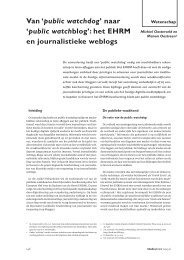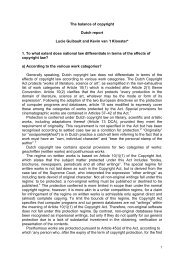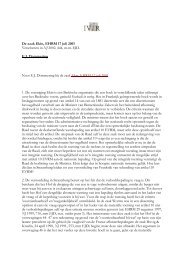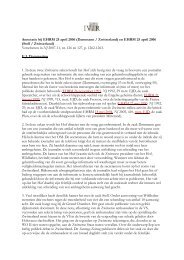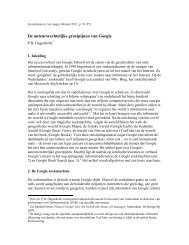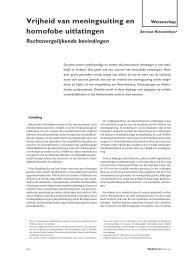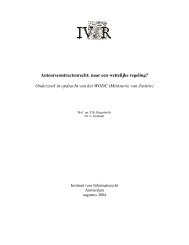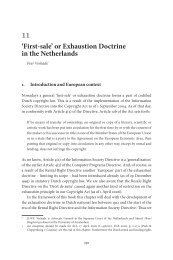unravelling the myth around open source licences - IViR
unravelling the myth around open source licences - IViR
unravelling the myth around open source licences - IViR
Create successful ePaper yourself
Turn your PDF publications into a flip-book with our unique Google optimized e-Paper software.
from conduct. With respect to contracts, article 6:217 CC provides that <strong>the</strong> multilateral juridical act<br />
is formed by <strong>the</strong> exchange of an offer and its acceptance, which can take place in any form, unless<br />
<strong>the</strong> parties have agreed o<strong>the</strong>rwise. This implies that, in principle, offer and acceptance can also be<br />
exchanged via electronic means. 153 The fact that juridical act is done for free may play a role in<br />
deciding whe<strong>the</strong>r an offer has been accepted or not. Commentators would seem to agree that, in <strong>the</strong><br />
case of gratuitous juridical acts (“rechtshandelingen om niet”), acceptance is presumed to have taken<br />
place more rapidly. 154<br />
Do offer and acceptance differ if <strong>the</strong> transaction takes place in <strong>the</strong> digital networked<br />
environment? 155 In order to tackle <strong>the</strong> persisting uncertainty <strong>around</strong> <strong>the</strong> formation of electronic<br />
contracts, <strong>the</strong> European legislator adopted <strong>the</strong> directive on electronic commerce in 2000. 156 The<br />
directive’s main objective is to ensure that <strong>the</strong> legal system of each Member State allows contracts to<br />
be validly concluded by electronic means. The scope of <strong>the</strong> directive is very broad, since it applies to<br />
all contracts concluded via electronic means, irrespective of whe<strong>the</strong>r a consumer is involved in <strong>the</strong><br />
transaction or not. To this end, all ‘information society services’ (ISS) have an obligation to provide<br />
certain information prior to <strong>the</strong> conclusion of <strong>the</strong> contract and to make <strong>the</strong> contract terms and<br />
general conditions available to <strong>the</strong> recipient in a way that allows him to store and reproduce <strong>the</strong>m. 157<br />
The directive on electronic commerce defines <strong>the</strong> ‘information society services’ as services within <strong>the</strong><br />
meaning of Article 1(2) of Directive 98/34/EC as amended by Directive 98/48/EC, and more<br />
specifically as ‘any service normally provided for remuneration, at a distance, by electronic means and<br />
at <strong>the</strong> individual request of a recipient of services’. Considering <strong>the</strong> formulation of this definition,<br />
one could wonder whe<strong>the</strong>r <strong>the</strong> on-line distribution of free <strong>open</strong> <strong>source</strong> software qualifies as an ISS.<br />
In <strong>the</strong> Explanatory Memorandum to <strong>the</strong> Dutch implementation act, 158 <strong>the</strong> Minister of Justice<br />
declared that <strong>the</strong> expression should be understood in broad terms and should not be limited to<br />
services where a contract must be concluded. The directive also covers activities for which <strong>the</strong> buyer<br />
pays nothing, such as <strong>the</strong> offer of on-line information or <strong>the</strong> making available of a search engine, if<br />
<strong>the</strong>se activities are generally offered against <strong>the</strong> payment of a price or if <strong>the</strong>y o<strong>the</strong>rwise possess a<br />
certain economic value. The determining factor in deciding whe<strong>the</strong>r a service falls under <strong>the</strong><br />
definition is not so much whe<strong>the</strong>r remuneration is paid for <strong>the</strong> service, but ra<strong>the</strong>r whe<strong>the</strong>r it<br />
constitutes an economic activity. In our opinion, <strong>the</strong> offer – albeit free of charge – by <strong>the</strong> vast<br />
majority of <strong>open</strong> <strong>source</strong> software distributors on <strong>the</strong> Internet definitely constitutes an economic<br />
activity that should be covered by <strong>the</strong> definition of ‘information society service’. Our judgement<br />
would differ, of course, if <strong>the</strong> <strong>open</strong> <strong>source</strong> software were distributed strictly by a private individual,<br />
such as via a student’s website.<br />
As a result of <strong>the</strong> implementation of <strong>the</strong> electronic commerce directive into Dutch law, new<br />
article 3:15d CC requires that anyone who provides an ‘information society service’ must make<br />
certain information accessible to <strong>the</strong> recipients of <strong>the</strong> service in an easy, direct and permanent<br />
manner. Particularly relevant in <strong>the</strong> context of <strong>the</strong> distribution of <strong>open</strong> <strong>source</strong> software are<br />
subparagraphs (a) and (b) of article 3:15d CC which require anyone who provides an information<br />
society service to supply his name and geographic address, as well as his electronic mail address, in<br />
order to allow him to be contracted rapidly and communicated with in a direct and effective manner.<br />
153 Van Esch 2004, p. 157.<br />
154 Bloembergen 1998, p. 71; Spindler and Wiebe 2003, p. 874.<br />
155 Stuurman, Westerdijk, and Sander 2000, p. 60.<br />
156 Directive 2000/31/EC of <strong>the</strong> European Parliament and of <strong>the</strong> Council of 8 June 2000 on Certain Legal Aspects of Information<br />
Society Services, in Particular Electronic Commerce, in <strong>the</strong> Internal Market (Directive on electronic commerce), 17 July 2000,<br />
O.J.E.C. L 178/1, art. 9 and ff. The directive has been transposed in Dutch law by <strong>the</strong> Aanpassingswet richtlijn inzake<br />
elektronische handel, Stb. 2004, No. 210.<br />
157 Stuurman, Westerdijk, and Sander 2000, p. 60.<br />
158 Tweede Kamer, 2001-2002, 28 197, nr. 3, p. 12.<br />
41



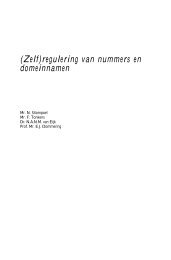
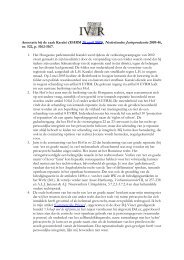
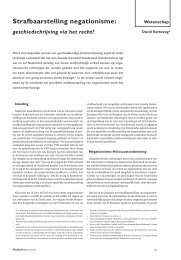
![Legal Opinion of Professor Egbert Dommering [1] concerning ... - IViR](https://img.yumpu.com/23603085/1/184x260/legal-opinion-of-professor-egbert-dommering-1-concerning-ivir.jpg?quality=85)
